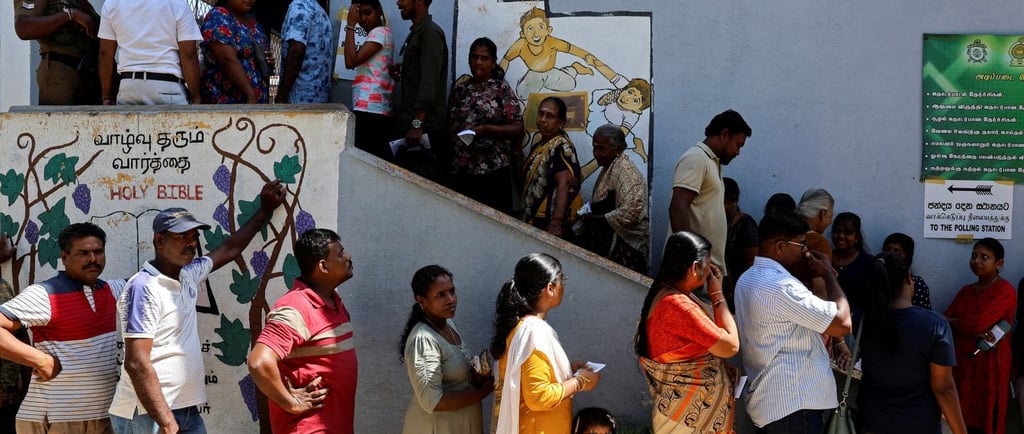Sri Lanka: A Battle Between Economic Stability and Social Change
Sri Lanka's 2024 presidential election marks a critical juncture as the nation grapples with the aftermath of economic collapse and widespread protests. With the future of the country hanging in the balance, will voters choose continuity under Ranil Wickremesinghe or a shift towards social reform with Sajith Premadasa?
SRI LANKA
Aisulu Sarmanova
9/14/20243 min read


On September 21, Sri Lanka will face one of its most significant political events in recent history: the 2024 presidential election. Widespread protests and economic collapse in 2022 forced former President Gotabaya Rajapaksa to flee and resign, leading to the ascension of current President Ranil Wickremesinghe. The upcoming election is widely seen as a referendum on Wickremesinghe’s two-year presidency, which has overseen a fragile economic recovery. However, he faces stiff competition from opposition leader Sajith Premadasa, a left-leaning politician with strong support from younger voters. With 38 candidates running and nearly 17 million of Sri Lanka's 22 million citizens eligible to vote, the stakes are high.
In Colombo’s political circles, it is widely known which candidates are favoured by key international players. Sajith Premadasa, leader of the Samagi Jana Balawegaya (SJB), is believed to have India’s backing, while the United States is reportedly supporting incumbent President Wickremesinghe, who is running as an independent. Sri Lanka’s most recent direct presidential election took place in 2019, with Gotabaya Rajapaksa of the Sri Lanka Podujana Peramuna (SLPP) winning a landslide victory over Premadasa. In 2022, amid nationwide protests, Rajapaksa resigned, leading to an indirect presidential election in Parliament, where Wickremesinghe was sworn in on July 21, 2022. As per the constitution, Wickremesinghe's term is set to end on November 17, 2024.
The 2024 election has been a hot topic since early this year, and the Election Commission has declared that the vote must be held between September 17 and October 16. A Gazette notification, published on July 26, confirmed that September 21 would be the election day, with nominations closing on August 15. The Election Commission chose a Saturday to maximise voter turnout. Wickremesinghe announced his candidacy for a second term, again running as an independent. The European Union has deployed an observation mission to monitor the elections, with MEP Nacho Sánchez Amor (S&D, Spain) serving as the Chief Observer.
Who are the frontrunners, and who is likely to emerge victorious? Incumbent President Wickremesinghe is seeking re-election, positioning himself as the architect of Sri Lanka's economic stabilisation. His campaign focuses on continuing economic reforms and strengthening international relations. He is viewed as a steady hand in navigating crises and maintaining relationships with global powers such as the United States and India.
His main rival, Sajith Premadasa, leader of the opposition, has built a campaign centred on social welfare initiatives and positioning himself as a candidate of change. His message resonates particularly with those seeking a fresh approach to social issues. Another notable candidate is Anura Kumara Dissanayake, leader of the National People’s Power movement. Known for his commitment to transparency and anti-corruption efforts, Dissanayake presents a strong third option.
Sri Lanka has held eight presidential elections since 1982, with each one producing a clear victor who secured over 50% of the vote. Wickremesinghe’s efforts to stabilise the economy after its 2022 collapse could appeal to voters prioritising continuity, particularly in terms of trade relations and attracting foreign investment. His leadership is seen as reassuring for both domestic and international businesses, given his experience and ability to manage crises.
On the other hand, Premadasa’s focus on social welfare could shift government priorities away from national enterprises and towards public services such as healthcare and education. While this may appeal to many voters, it could disrupt ongoing economic reforms and impact Sri Lanka's relationships with international financial institutions, which have played a vital role in the country's recovery. Premadasa’s presidency could also create opportunities for businesses partnering with local industries, as his policies would likely focus on domestic growth.
Dissanayake’s anti-corruption stance, meanwhile, could bring tighter regulations, which might affect companies involved in unethical practices or inefficient operations. His policies could lead to greater transparency and accountability but may also increase the regulatory burden on businesses.
For companies looking to invest or operate in Sri Lanka, the outcome of the 2024 election will be pivotal. The country could continue its current path of economic recovery, prioritising international trade and financial reforms, or pivot towards policies focused on social aid and domestic reforms. In either scenario, businesses will face a mix of opportunities and challenges as Sri Lanka navigates its next chapter.


